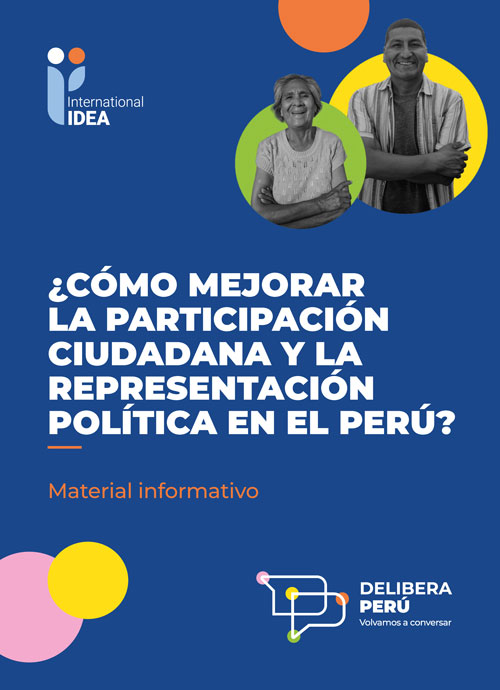The African Union Commission (AUC) and the International Institute for Democracy and Electoral Assistance (International IDEA) have signed a Memorandum of Understanding (MoU) that establishes terms and conditions concerning their strategic partnership in strengthening continental capacities for democratic governance, effective electoral processes, political participation, conflict prevention, mediation and peacebuilding in collaboration with African Union Member States.
Search
Region
Country
Type
El pasado 7 de febrero de 2023 marcó el trigésimo séptimo aniversario del fin de la dictadura de los Duvalier en Haití. En la madrugada de aquella noche memorable, después de sendas movilizaciones populares, Jean Claude Duvalier huyó para poner fin a cerca de tres décadas de un régimen autocrático familiar, durante las cuales, él y su padre, condujeron brutalmente el país.
A few weeks away from the one year anniversary of the Russian invasion of Ukraine, and in a stark warning that the clock is the “closest it has ever stood to humanity’s darkest hour”, United Nations Secretary-General Antonio Guterres’ annual 2023 speech to the UN General A
Las elecciones seccionales del pasado 5 de febrero en Ecuador confirman algo de lo cual muchos analistas ya venían hablando desde hace meses: la debilidad del gobierno de Guillermo Lasso. A pesar de que no todos los resultados que se dieron fueron los esperados, el panorama general después de las elecciones es el de un ejecutivo sumamente frágil, que deberá enfrentar importantes dificultades en términos de gobernabilidad en lo que resta de su período.
On 5–6 December 2022, International IDEA gathered 30 leading experts on democracy, anti-corruption and human rights at the inaugural Democracy in Asia and the Pacific Outlook Forum. Representing 23 institutions and organizations from 12 countries, attendees discussed key trends in democracy in the Asia and the Pacific region over the course of seven topical sessions.
Some observations from updating the Voter Turnout Database in 2022.
El próximo domingo 5 de febrero tendremos un nuevo proceso electoral en Ecuador.
The African Union Commission (AUC) and the International Institute for Democracy and Electoral Assistance (International IDEA) have signed a Memorandum of Understanding (MoU) that establishes terms and conditions concerning their strategic partnership in strengthening continental capacities for democratic governance, effective electoral processes, political participation, conflict prevention, mediation and peacebuilding in collaboration with African Union Member States.
As global democracy faces headwinds, EU should lead in new geopolitical reality
International IDEA believes that diversity can strengthen democracy and peaceful cohesion if values of inclusion and the right for equal participation for all citizens are protected. Without safeguarding these values, a diverse country like Sudan may find itself in a very risky situation that can lead to never ending violent conflicts.
In a bid to deepen relationships across the Asia-Pacific region, the International Institute for Democracy and Electoral Assistance’s (International IDEA) Secretary-General Dr Kevin Casas-Zamora met with multiple political, electoral and stakeholder groups in Australia and India during his October 2022 mission to the regional headquarters in Canberra.
This Policy Brief provides a snapshot of the full Recommendations Report: The EU’s External Democracy Policy in a New Geopolitical Reality. Its purpose is to inspire future EU democracy policy to ensure it can defend democracy globally and at home in line with the EU’s declared intention to become a stronger geopolitical player.
The European Union has traditionally been one of the world’s staunchest advocates of democracy but major changes have affected the global democracy landscape in recent years. With the support of the Swedish Ministry for Foreign Affairs, International IDEA led an analysis of the EU’s external democracy policy during 2022 to inform the EU discussion on democracy during Sweden’s 2023 Presidency of the Council of the EU.
Despite three decades of international support and an intensified, structured EU accession process in the last 20 years, democracy is not faring significantly better in the region. Montenegro, Serbia and, as of mid-2022, also Albania and North Macedonia are candidates for EU accession with official negotiations opened. Bosnia and Herzegovina was granted status of candidate country under the condition of further reforms in October 2022.
The European Union’s Eastern Partnership (EaP) covers six countries: Armenia, Azerbaijan, Belarus, Georgia, Republic of Moldova and Ukraine. The Covid-19 pandemic put a strain on fledgling democracies in the EaP region, aggravating pre-existing concerns, such as the weak rule of law, insufficient accountability of executive branches vis-à-vis legislatures and fragile media freedoms (see International IDEA 2022).
The state of democracy in the Latin America and the Caribbean region is clouded by the global geopolitical context affected by the Covid-19 pandemic, a hard-hitting recession and the commercial tensions between China and the USA.
This technical paper explores and analyses diversity management in Sudan’s democratic transition arrangement (2019–2021). It primarily utilizes the concept of ‘diversity management’ for legislative practice. To administer geographical, multicultural, multi-ethnic and multilingual population diversity, Sudan has passed, in accordance with international principles, many laws to manage diversity in a way that reflects strategic national planning.
Over the last five years, the continent has witnessed a decline in the number of democratic systems, with 45 per cent of the population now living in hybrid regimes. The quality of democracy is also impacted by increasing insecurity, attempts at reversing the presidential term limits, contested electoral outcomes and an increased role for the military in regime transitions.
